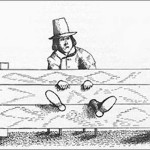Today, Melchior the Very Large Cat is banging his kitty-sized gong, campaigning for all original content. “I tried Grammarly’s plagiarism checker free of charge because it never pays to steal someone else’s meeses.” All but the most grammarly of us has made a mistake in writing the English language. We lay when we should lie and we loose when we clearly need to lose.
Writing Tip for Today: I regularly warn writers not to rely on their spellchecker, lest they wind up waisting their wasted time, braking their necks or some other gaffe. Homophones are as dangerous as stealing someone else’s writing, although not nearly as humorous. Here are some usage/grammar rules to keep in mind.
Chickens Lay, People Lie (down). Unless your character is uneducated and talks like it, please have him lie down. To better understand lay, laid or lain, see Strunk & White’s Elements of Style. Lay always means to put or place–except when it’s the past tense of lie (to recline). No wonder writers hate grammar! Lay (to put) lay, laid, laid. Lie (to recline): lie, lay lain. And we haven’t even touched on fibbing (to LIE: (tell a falsehood).
- THERE’s a Problem. When we talk about more than one of anything, the proper form is THERE ARE, not there is or there’s. Reading “There’s way too many problems in this world” sets my teeth on edge, in addition to being incorrect. The same singular/plural problem has arisen out of political correctness in pronouns. In the olden days, a singular pronoun would be written as “he” unless the gender was specified as only female. Now, he or she sounds clunky, and popular usage of “they” has replaced that “he.” If you feel restricted, change the number to more than one in agreement with THEY. Instead of, “A reader will stop reading if THEY think your opening is slow,” switch to, “Readers will stop reading if they think your opening is slow.”
- Who’s Your Daddy? The rule states: Capitalize father and mother when used in address (that is, talking directly to them), but do not capitalize such nouns when a possessive pronoun is used with them. EX: Yes, Mother, I am going. My father is at home. When you talk about Mother, you capitalize. When you say my mother, leave off the capital. In other news, capitalize all the titles a person holds: The Very Reverend John Clark, the Honorable Judge John Dow. But DO NOT capitalize the office when it stands alone: The judge called for a twenty-minute recess. Many other grammar, usage and spelling rules make our fair language a bit of a challenge. If you struggle, get a reliable resource such as Elements of Style, Elements of Grammar, or Eats, Shoots and Leaves. There are many others. And if you haven’t got time to look stuff up, try a computer program like the one Melchior The Very Large Cat uses.






Hi fantastic fans: Just so you know, I agreed to promote Grammarly in exchange for a free pass to Amazonland. My text in the post looks sort of funky and I can’t figure out why, but I will definitely be using my Amazon bucks to buy some good books!
Thanks Linda. Helpful as always.
Thanks, Wendy. It’s important to get the little things right, isn’t it? Write on, Linda
The lays and lies ate my lunch for so many years! And I have chickens and collect the eggs they lay every day! tee hee hee As Tony the Tiger would say, you’ve got GggrrrrrEIGHT tips, Miss Linda! Thanks for sharing them at AHA!
Thanks Caryl! Sometimes I try to avoid “laying” altogether, substituting “set” as in “She set the keys on the table.” Or as my hillbilly dad would say, “Set yourself down!” LOL. Write On, Linda